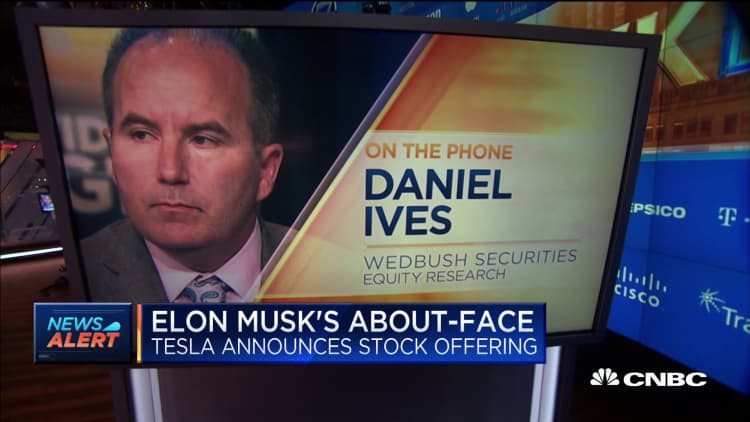Tesla shares briefly sold off this morning with the announcement that the company plans to raise $2 billion by selling new shares of stock — diluting the shares of people who already own Tesla — but analysts are saying the money will let Tesla expand faster and secure its sources of batteries as it pushes into giant markets for small sport-utility vehicles and pickup trucks.
The company said it plans to use the proceeds "to further strengthen its balance sheet and for general corporate purposes." It will offer 2.65 million Tesla shares through underwriters Goldman Sachs and Morgan Stanley, with expected gross proceeds of $2.3 billion before discounts and expenses.
The move marks a sharp change in finance strategy from what Tesla was saying on its fourth-quarter earnings call two weeks ago, when CEO Elon Musk said the company had no plans to raise money in the stock or bond markets and could finance its expansion through retained earnings and the $6.5 billion in cash on its balance sheet. Musk and board member Larry Ellison plan to invest as much as $10 million and $1 million, respectively, in the deal.
At the same time, Tesla disclosed in a SEC regulatory filing that it is accelerating its capital spending, exploiting a hot market for its shares to move faster. Analysts think the move could mean the company builds a battery plant in Texas, as Musk hinted at on Twitter last week. And it may mean the company moves faster than expected to build its forthcoming car plant in Germany.
"We think it's a good idea," said CFRA Research analyst Garrett Nelson, who rates Tesla a "sell" because of the sharp run-up in its stock over the past year. "One of the risks we had was the factory in Germany. And with them now talking about a factory in Texas, it makes a lot of sense."
Tesla will spend between $2.5 billion and $3.5 billion on capital projects such as factories in each of the three years beginning in 2020, Nelson said. Previously, the company had been expected to spend $2 billion to $2.5 billion this year and next year, he said. The company slowed capital spending to $1.3 billion in 2019 after the introduction of its Model 3 sedan.
That is likely to delay the expected ramp-up in Tesla's free cash flow, which has been one cause of the surge in Tesla's shares to as much as $969.79 last month, after trading as low as $177 last spring. Shares fell as much as 6% in pre-market trading but reversed their losses later on Thursday morning.
Tesla will generate about $1 billion in free cash flow this year, Nelson said, about the same as it did in the fourth quarter alone of 2019, when capital spending was much lighter. Previously, he had expected about $1.5 billion.
A hedge against risk
"The capital spending guidance is higher than we had predicted previously and a lot higher than what they had said before," Nelson said. But he said the money will provide useful insurance against glitches in its China operation that may stem from the coronavirus outbreak, among other problems.

The money really represents Musk and chief financial officer Zachary Kirkhorn taking out insurance against future problems, Baird analyst Ben Kallo said — even though they said recently they might not raise money ever again.
The biggest challenge the company faces in rolling out the Model Y and other new models is battery availability, Kallo said, and moving faster to expand is the way to keep access to batteries from slowing Tesla's product launches. Tesla has spoken in the past about electric battery shortages, as well as limited supply of the minerals that are used in battery production. He said rivals like BMW and Mercedes have seen their expansion in EVs slowed because of supply chain issues. Jaguar announced a few days ago a similar battery supply issue slowing EV car production.
Like Nelson, Kallo says Tesla's free cash flow this year will be a little more than $1 billion — but with a twist.
Wall Street has been conservative about the projected growth of the Model Y small SUV — maybe too conservative, says Kallo, a longtime bull who changed his recommendation on Tesla to "sell" in January as shares neared their peak.
His own forecast assumes that Tesla sells only 32,000 model Y's, much fewer than the 300,000 Model 3's it delivered last year, in part to be conservative about the company's ability to manage its supply chain for the new model. The company had promised the Y would arrive around mid-year, but said more recently that it is already producing the vehicle in small quantities and will begin deliveries by next month.
But underlying demand for the small SUV is likely much larger than that, Kallo said. For example, Toyota sold 448,000 of the comparably sized, less expensive RAV4 in 2019, according to CarSalesBase.com. If the supply chain doesn't force Tesla to stumble on the Model Y introduction, sales could be several times his forecast, Kallo said.
"This is where the sell side of the Street is missing it — volumes for the Y," he said. "Analysts are using the ramp for the 3 as their model — but Tesla can ramp the Y much faster.''
If anything, Kallo argued, Tesla's deal is too small.
"They could have been more aggressive,'' he said. "It shows their confidence in their ability to generate cash flow and access to other forms of credit. The headline that the stock is getting hammered is misleading. The stock will likely trade up later in the day and after the deal gets done.''
But the real payoff is down the road, Wedbush analyst Dan Ives said in a report.
"Given [spending on] Gigafactory 3, Europe and autonomous [self-driving vehicles], we ultimately believe this morning is a potential game changer, putting [Tesla] in a much stronger capital position over the coming years with competition increasing from all angles," Ives wrote. "The Tesla story changes today (for the positive) with this capital raise."
Long-time Tesla bull Cathie Wood of Ark Invest — who has a $7,000 long-term price target on the stock — tweeted after the stock offering news that her analysis assumes $15 billion of equity dilution in the next five years, for projects including potential manufacturing expansion in China, therefore, $2 billion now makes sense.






